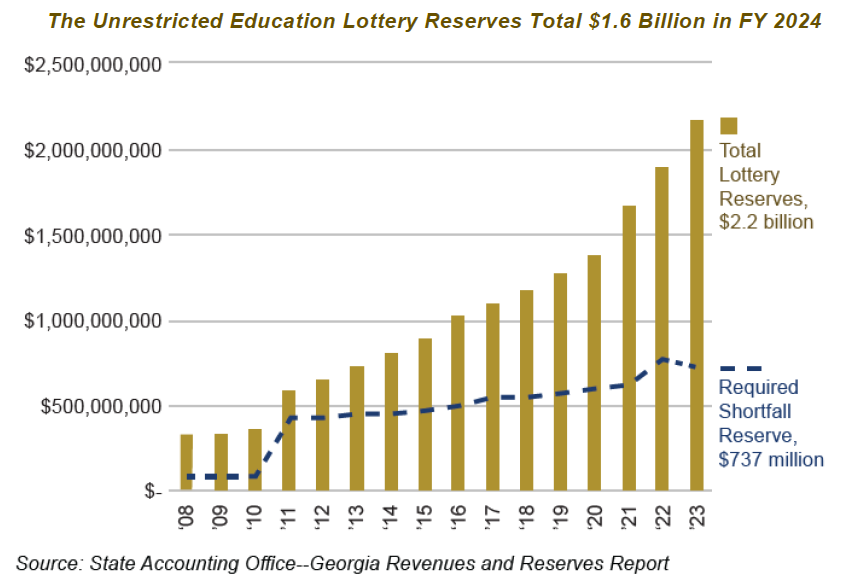Introduction
The Georgia Student Finance Commission (GSFC) is the state’s higher education finance agency with over 20 state and lottery funded scholarships, grants and loans. To ensure that students are prepared for post-secondary education, GSFC provides free financial aid counseling to K-12, post-secondary institutions and community organizations.
Amended Fiscal Year 2025 Budget
- $6 million increase to meet the projected need for the HOPE Scholarship program at the University System of Georgia (USG). HOPE Scholarships are for students seeking associate or bachelor’s degrees at four-year public intuitions.
- $2 million increase to meet the projected need for the HOPE Grant program at the Technical College System of Georgia (TCSG). HOPE Grants include the HOPE/Zell Miller Grant for students enrolled in certain certificate and diploma programs at public two-year colleges
- $21 million increase to meet the projected need for the Dual Enrollment program. The Dual Enrollment program allows high school students to pursue post-secondary courses at an approved public or private institution, while receiving high school and college credit.
Governor Brian Kemp’s proposed FY2026 budget includes $1.56 billion (increase from FY2025 budget of $1.49 billion) for Georgia’s lottery-funded pre-kindergarten (pre-K), HOPE (Helping Outstanding Pupils Educationally) and other financial aid programs. Approximately $1 billion is allocated for HOPE and $563 million is earmarked for pre-K education.
Fiscal Year 2026 Budget
- $60 million increase to meet the projected need for the HOPE Scholarship program at public institutions in the University System of Georgia (USG)
- $3 million increase to meet the projected need for the HOPE Scholarship program at private institutions in Georgia
- $17 million increase to meet the projected need for the HOPE Grant program at the Technical College System of Georgia (TCSG)
- No changes to the $10 million total for the College Completion Grant Program which provides need-based financial aid to eligible students to students who are 80% complete toward their program credential/degree at two-year and four-year colleges
- No changes to the $2.6 million total for Inclusive Postsecondary Education Grants which provides financial aid to students with intellectual and developmental disabilities who are currently enrolled in the Georgia Inclusive Postsecondary Education program at a postsecondary institution.
- No changes to the $24 million total for Tuition equalization Grants, which provides grants to Georgia residents who attend eligible private postsecondary institutions.
- $6 million total, for the REACH Georgia Scholarship which provides need-based scholarships participants in the REACH Georgia mentorship and scholarship program
Education Lottery Reserves
The education lottery reserve totaled $2.1 billion at the beginning of FY ‘24, including $1.5 billion for expenditures like the HOPE Scholarship and the HOPE Grant programs.[1] After adding the FY 2024 proceeds, the lottery reserves now stand at $2.4 billion. Lawmakers require a shortfall reserve of 50% of the prior year’s lottery proceeds to sustain the education lottery reserves for the HOPE Scholarship program. In 2024 the required shortfall reserves totaled $779 million.[2] An additional $1.6 billion remains in the unrestricted education lottery reserves.[3]
Lottery Reserves Should Fund a Statewide Need-based Financial Program
Georgia ranks third in the nation for student loan debt per borrower, forcing many Georgians to delay homeownership and retirement.[4] Georgia has the highest average of student loan debt per borrowers in the south.[5] The lack of state sponsored need-based financial aid has a direct impact on the student loan debt crisis in Georgia.

Eliminating financial barriers allows students to navigate college affordability and addresses the student loan debt crisis in Georgia. Financial aid policies like the College Completion Grant program are a step in the right direction. However, this program has a limited budget of $10 million to include all higher-ed institutions in Georgia and a lifetime award cap of $2500 per-person. This means many students are still left with a hefty balance.
In the 2025 Legislative Session, lawmakers have the power to pass comprehensive need-based financial aid to reduce student loan debt in Georgia. All Georgians deserve affordable opportunities that lead to gainful employment and the right to economic well-being.
Endnotes
[1] State Accounting Office. (2024). 2024 report of Georgia revenues and reserves. Retrieved December 14, 2024, from https://sao.georgia.gov/swar/grr.
[2] Ibid
[3] Ibid
[4] Hanson, M. (2023, May). Student loan debt by state [2023]: average + total debt. Education Data Initiative. https://educationdata.org/student-loan-debt-by-state
[5] Ibid










